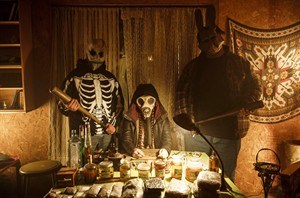
A scene from "Rhymes for Young Ghouls" is shown in this undated handout photo. "THE CANADIAN PRESS/HO - eOne Films
January 29, 2014 - 8:20 AM
TORONTO - It's 1976 on the Red Crow Mi'gMaq reserve and a tough-as-nails teen is dealing dope so she can make money to pay off a corrupt Indian agent and avoid residential school.
Though the plot from the new Canadian film "Rhymes for Young Ghouls" is set in a fictional place nearly four decades ago, it's still timely as the horrors of Canada's aboriginal residential school system continue to cause ripples in First Nations communities, says writer-director Jeff Barnaby.
"I think just the self-esteem issues, that has to be the most resounding residual effect and, of course, the sexual abuse issues," he said in an interview. "I mean, studies have shown that if you're abused as a child you're more likely to do something like that as you get older.
"And just to get over the horrors of something like that, it's not something that you can do in a generation or two. I think that residual effect just goes on and on and on."
Continued Barnaby: "I explain it like your great-great-grandmother goes to a residential school and she gets told that she's worthless and nothing, and if she survives that experience, she has it ingrained in her head and then she tells that to her kids and they tell it to her kids and tell it to her kids.
"And then next thing you know, it's 2014 and you're a young person growing up on a reserve and have this feeling and you have no real association as to where it comes from, because nobody teaches you about it; it more or less gets swept under the rug."
Opening Friday in Toronto and on Feb. 14 in Vancouver, "Rhymes for Young Ghouls" stars Native American/Mohawk actress Kawennahere Devery Jacobs as the heroine Aila, who has witnessed the accidental death of her younger brother as well as the suicide of her mother and the incarceration of her father (Glen Gould).
Left to fend for herself, the 15-year-old helps her uncle Burner (Brandon Oakes) with his drug business in order to pay her "truancy tax" to the Indian agent Popper (Mark Antony Krupa), who runs the residential school and takes bribes from those who want to avoid it.
When Aila's money is stolen, she and others exact revenge upon the agent, who has a long-standing history with the family.
The unflinching drama has been lauded on the film festival circuit, and at the recent Toronto Film Critics Association awards, venerated filmmaker Norman Jewison deemed Barnaby the recipient of $50,000 in services donated by Technicolor.
Barnaby wrote the story, his debut feature, after making short films including the Genie-nominated "File Under Miscellaneous."
He used women in his life as inspiration, including his grandmother who was in a residential school.
"Nobody talks about what happened at that school," said Barnaby, who grew up on the Mi'gmaq reserve in Listuguj, Que. "I don't think that's something they wanted their children or their grandchildren knowing that they went through.
"Because why would you want to put that into a child's brain — that there are individuals out there that hate you so much that they're willing to do this to you? I think it just got this stigma or shame to it that it became impossible to talk about.
"So I think that's why, decades after the fact, we're still talking about it and things are still being uncovered, because I think the victims of this horrible thing are just starting to come to terms with it now, and I think they want to kind of pass on this knowledge so that it doesn't happen again."
Barnaby said part of the reason why he wanted to make the film was to raise awareness to ensure "nothing like this ever happens again in Canada."
That said, he wanted to create a film that captured the public's attention but
"didn't seem heavy handed or it didn't seem preachy."
Still, the film does contain irreverent humour and "a popcorn movie" style Barnaby said he was deliberately aiming for in order to deliver "an entertaining movie" and "get some sort of box office."
"I didn't want to make a poverty porn, put it that way. I wanted to make an entertaining movie. I wanted to make a 'Road House' with my Patrick Swayze as a 15-year-old girl ... or 'Conan the Barbarian' with my Conan as a 15-year-old girl."
When he found Jacobs for the role, she was a hard-working university student and tomboy who was a waitress at what he called "a rough-and-tumble reserve bar."
"She would've saw and heard all the things that we were going to put into the film, and that's what we wanted," said Barnaby, who shot the film in and around Montreal. "We didn't want a dainty little girly girl kind of prancing around the set, and she came and she delivered and at no one point did she ever complain."
Barnaby said his upcoming projects include a zombie movie he wrote that's now in the hands of the people involved with the hit zombie TV series
"The Walking Dead."
And he's penning a new project, a "cyber punk/serial killer/hooker/big oil movie" about the disappearance of aboriginal women in Canada.
"I'm trying to tackle the disappearing women in Canada — the 600-plus — and kind of give them a voice next."
___
Follow @VictoriaAhearn on Twitter.
News from © The Canadian Press, 2014